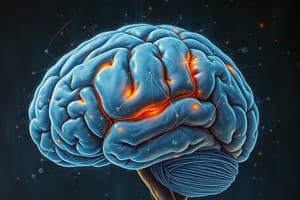Podcast
Questions and Answers
What is associated with greater resilience to stress according to the findings on the 5-HTT gene?
What is associated with greater resilience to stress according to the findings on the 5-HTT gene?
- Long alleles (correct)
- Exposure to stress
- One or two short alleles
- Life-stress inventory
According to Bransford & Johnson, context provided after a passage significantly improves recall compared to no context at all.
According to Bransford & Johnson, context provided after a passage significantly improves recall compared to no context at all.
False (B)
What theory was investigated by Bransford & Johnson in their study on memory?
What theory was investigated by Bransford & Johnson in their study on memory?
Schema theory
Memories of __________ events were found to be more vivid and detailed according to Brown & Kulik's research.
Memories of __________ events were found to be more vivid and detailed according to Brown & Kulik's research.
Match the study to its key concept:
Match the study to its key concept:
Which of the following is a conclusion from the findings regarding the 5-HTT gene?
Which of the following is a conclusion from the findings regarding the 5-HTT gene?
Emotional significance has no impact on memory retention according to the findings related to flashbulb memories.
Emotional significance has no impact on memory retention according to the findings related to flashbulb memories.
In the study by Brown & Kulik, which significant public event was specifically mentioned as being vividly recalled by participants?
In the study by Brown & Kulik, which significant public event was specifically mentioned as being vividly recalled by participants?
What was the aim of Tajfel's (1970) study?
What was the aim of Tajfel's (1970) study?
Bandura's (1961) experiment found that children are more likely to imitate aggressive behavior when the model is punished.
Bandura's (1961) experiment found that children are more likely to imitate aggressive behavior when the model is punished.
What concept does social identity theory support in relation to group membership?
What concept does social identity theory support in relation to group membership?
Tajfel's study demonstrated in-group favoritism based on __________ group criteria.
Tajfel's study demonstrated in-group favoritism based on __________ group criteria.
Match the researchers with their key concepts:
Match the researchers with their key concepts:
Which group showed higher conformity rates in Berry's (1967) study?
Which group showed higher conformity rates in Berry's (1967) study?
The Bobo doll experiment by Bandura concluded that behavior is learned through observation and reinforcement.
The Bobo doll experiment by Bandura concluded that behavior is learned through observation and reinforcement.
In Bandura's study, children observed adults acting __________ towards a Bobo doll.
In Bandura's study, children observed adults acting __________ towards a Bobo doll.
What was the main finding of Draginski et al. (2004) regarding the juggling group?
What was the main finding of Draginski et al. (2004) regarding the juggling group?
Cortisol has a positive effect on verbal declarative memory.
Cortisol has a positive effect on verbal declarative memory.
What is the key concept explored in Caspi et al. (2003)?
What is the key concept explored in Caspi et al. (2003)?
The increased grey matter observed in jugglers is primarily associated with __________.
The increased grey matter observed in jugglers is primarily associated with __________.
What was the dosage of cortisol that significantly impaired memory performance in Newcomer et al. (1999)?
What was the dosage of cortisol that significantly impaired memory performance in Newcomer et al. (1999)?
After stopping juggling practice for three months, the increase in grey matter __________.
After stopping juggling practice for three months, the increase in grey matter __________.
What effect does low cortisol dosage have on memory performance according to Newcomer et al. (1999)?
What effect does low cortisol dosage have on memory performance according to Newcomer et al. (1999)?
Flashcards
Schema Theory
Schema Theory
Our prior knowledge helps us understand and remember information better - think of it as a mental framework.
Bransford & Johnson (1972)
Bransford & Johnson (1972)
This study showed that having context before we learn something helps us remember it better, proving schema theory.
Flashbulb Memory
Flashbulb Memory
A special type of memory that is vivid and detailed, often tied to highly emotional events.
Brown & Kulik (1977)
Brown & Kulik (1977)
Signup and view all the flashcards
Gene-Environment Interaction
Gene-Environment Interaction
Signup and view all the flashcards
5-HTT Gene and Depression
5-HTT Gene and Depression
Signup and view all the flashcards
Resilience
Resilience
Signup and view all the flashcards
Long 5-HTT Allele
Long 5-HTT Allele
Signup and view all the flashcards
What is social identity theory?
What is social identity theory?
Signup and view all the flashcards
What is Tajfel's (1970) experiment about?
What is Tajfel's (1970) experiment about?
Signup and view all the flashcards
What is social cognitive theory?
What is social cognitive theory?
Signup and view all the flashcards
What did Bandura (1961) study?
What did Bandura (1961) study?
Signup and view all the flashcards
What is cultural conformity?
What is cultural conformity?
Signup and view all the flashcards
What did Berry (1967) study?
What did Berry (1967) study?
Signup and view all the flashcards
What are individualist cultures?
What are individualist cultures?
Signup and view all the flashcards
What are collectivist cultures?
What are collectivist cultures?
Signup and view all the flashcards
Neuroplasticity
Neuroplasticity
Signup and view all the flashcards
Neural Pruning
Neural Pruning
Signup and view all the flashcards
Draginski et al. (2004)
Draginski et al. (2004)
Signup and view all the flashcards
Cortisol
Cortisol
Signup and view all the flashcards
Newcomer et al. (1999)
Newcomer et al. (1999)
Signup and view all the flashcards
5-HTT Gene
5-HTT Gene
Signup and view all the flashcards
Caspi et al. (2003)
Caspi et al. (2003)
Signup and view all the flashcards
Study Notes
Biological Approach
-
Draginski et al. (2004): Neural pruning and neuroplasticity. Investigated if brain structure changes in response to learning.
- Participants were divided into jugglers and non-jugglers.
- MRI scans were taken before and after juggling, and after stopping.
- Jugglers practiced for a minimum of 60 seconds daily.
- Findings showed increased grey matter in the mid-temporal area in the jugglers' group (related to visual memory). This increase reduced significantly after they stopped practicing.
- Conclusion: Neuroplasticity allows the brain to adapt, but changes might not be permanent without continued practice. This highlights the relationship between environment and brain structure.
-
Newcomer et al. (1999): Cortisol and memory. Investigated how stress hormone cortisol affects verbal declarative memory.
- Participants were divided into high cortisol (160 mg/day), low cortisol (40 mg/day), and placebo groups.
- Over four days, participants listened and recalled prose paragraphs.
- Findings: High cortisol levels significantly impaired memory performance compared to placebo and low-dose groups. Low doses had minimal impact.
- Conclusion: Cortisol (stress hormone) negatively impacts memory, especially at high levels.
-
Caspi et al. (2003): Gene-environment interaction (5-HTT gene). Investigated whether the 5-HTT gene influences the impact of stressful life events on depression.
- 847 participants were tested for their 5-HTT alleles (long or short).
- Participants documented life stressors and depression symptoms.
- Findings: Participants with short alleles of the 5-HTT gene, coupled with stress, were more likely to develop depression. Long alleles were shown to provide greater resilience.
- Conclusion: The 5-HTT gene influences susceptibility to depression in response to stress; there is an interaction between genes and environment.
Cognitive Approach
-
Bransford & Johnson (1972): Schema theory and prior knowledge's effect on memory comprehension
- Participants heard complex passages about laundry with or without prior contextual information (before, after, or none at all).
- Context provided before the passage improved recall significantly. Context afterwards did not help compared to no context .
- Conclusion: Schemas help encode and retrieve information easily; prior knowledge is important in memory comprehension.
-
Brown & Kulik (1977): Flashbulb memories. Explored how emotions affect vivid memories of significant events.
- Participants recalled memories of public and personal significant events (e.g., JFK's assassination).
- They described the circumstances (location, emotions, etc.)
- Conclusion: Emotional significance makes memories very vivid and detailed, especially compared to non-emotional events.
Sociocultural Approach
-
Tajfel (1970): Social identity theory. Investigated factors needed for group bias and discrimination.
- Boys were randomly placed into groups based on trivial criteria.
- They were asked to allocate points to members of their own and other groups based on matrixes.
- Findings: The boys consistently favored their in-group; even if it meant potentially lower overall group rewards.
- Conclusion: Social identity alone can drive discrimination, highlighting group membership's influence on self-esteem.
-
Bandura (1961): Social cognitive theory. Examined if children learn aggression through observation.
- Children watched adults act aggressively or non-aggressively towards a Bobo doll.
- Some models were rewarded/punished.
- Findings: Children who observed aggressive behavior imitated the model's actions, especially when the model was rewarded. Boys were more prone to mimicking physical aggression.
- Conclusion: Behavior is learned through observation and reinforcement, emphasizing the role of modeling in social learning.
-
Berry (1967): Cultural conformity. Investigated how cultural dimensions (individualism/collectivism) influence conformity.
- Participants from individualist and collectivist cultures completed an Asch-style conformity task, with incorrect information given about others' answers.
- Findings: Participants from collectivist cultures showed significantly higher rates of conformity than those from individualist cultures.
- Conclusion: Cultural dimensions like individualism/collectivism impact behavior, specifically conformity.
Studying That Suits You
Use AI to generate personalized quizzes and flashcards to suit your learning preferences.




